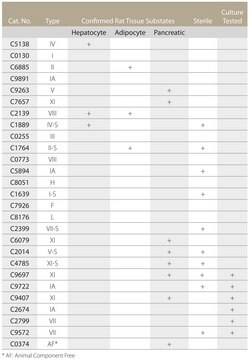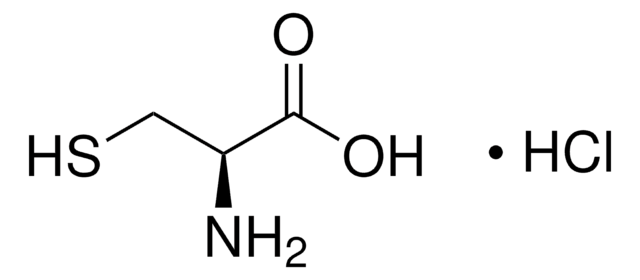C7352
L-Cysteine
from non-animal source, BioReagent, suitable for cell culture, ≥98%
Synonym(s):
(R)-2-Amino-3-mercaptopropionic acid
About This Item
Recommended Products
biological source
non-animal source
Quality Level
product line
BioReagent
Assay
≥98%
form
crystalline powder
technique(s)
cell culture | mammalian: suitable
impurities
endotoxin, tested
color
white
mp
240 °C (dec.) (lit.)
solubility
H2O: 25 mg/mL
SMILES string
N[C@@H](CS)C(O)=O
InChI
1S/C3H7NO2S/c4-2(1-7)3(5)6/h2,7H,1,4H2,(H,5,6)/t2-/m0/s1
InChI key
XUJNEKJLAYXESH-REOHCLBHSA-N
Looking for similar products? Visit Product Comparison Guide
General description
Application
- as a media supplement in Trypticase-Yeast Extract-Iron-Serum (TYI-S-33) media for the culture of Giardia lamblia, to make enzyme solution in Dulbecco′s modified Eagles medium (DMEM) to establish hippocampus culture
- to test its protective effect on acrylamide induced toxicity in testis
- in the preparation of tris acetic acid extender solution for cryopreservation of semen
- as an additive to make papain digestion solution
Biochem/physiol Actions
Other Notes
Storage Class Code
11 - Combustible Solids
WGK
WGK 1
Flash Point(F)
Not applicable
Flash Point(C)
Not applicable
Personal Protective Equipment
Certificates of Analysis (COA)
Search for Certificates of Analysis (COA) by entering the products Lot/Batch Number. Lot and Batch Numbers can be found on a product’s label following the words ‘Lot’ or ‘Batch’.
Already Own This Product?
Find documentation for the products that you have recently purchased in the Document Library.
Customers Also Viewed
Articles
Antioxidants protect biological systems from oxidative damage produced by oxygen-containing free radicals and from redoxactive transition metal ions such as iron, copper, and cadmium.
Protocols
Separation of L-Alanine; Glycine; L-Valine; L-Leucine; L-Isoleucine; L-Proline; L-Methionine; L-Serine; L-Threonine; L-Phenylalanine; L-Aspartic acid; L-4-Hydroxyproline; L-Cysteine; L-Glutamic acid; L-Asparagine; L-Lysine; L-Glutamine; L-Histidine; L-Tyrosine; L-Tryptophan; L-Cystine
Chromatograms
application for HPLCOur team of scientists has experience in all areas of research including Life Science, Material Science, Chemical Synthesis, Chromatography, Analytical and many others.
Contact Technical Service








